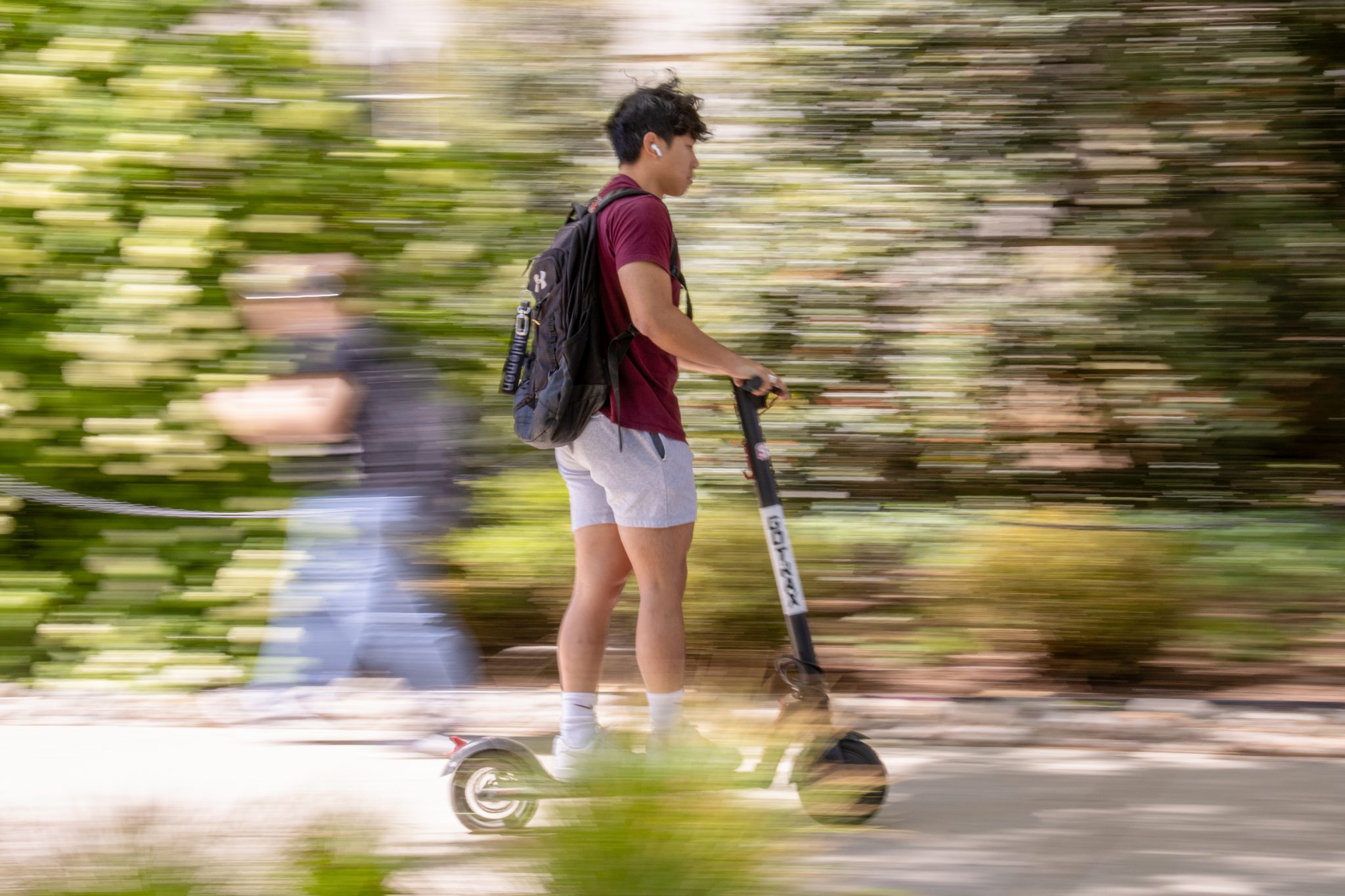Despite DOTS facing recent struggles with debt, the University of Maryland is set to enter the fall semester with intact shuttle routes, this campus’ first dedicated bike lanes and 240 new micromobility parking spaces.
Since 2019, the Department of Transportation Services has accumulated $7 million in debt — with the COVID-19 pandemic and mandatory salary increases accounting for a substantial share of the budget shortfall, according to university vice president and chief administrative officer Carlo Colella.
On Friday, the Board of Regents approved the DOTS request for an about 16.4 percent Shuttle-UM fee increase. While DOTS has requested similar fee increases in the past, those averaged about five percent. The new fee increase will cost students about $22 more per semester.
The additional funding is needed to avoid cutting bus routes in the fall, Colella told The Diamondback.
Syed Azan Ali, a representative for South Campus Commons in both the Student Government Association and the Residence Hall Association, supported this fee increase.
“It’s a necessary, one-time increase,” Ali, a junior government and politics and Persian studies major, said. “I personally would prefer to not have shuttle cuts until the Purple Line is actually open.”
Because DOTS is self-supported, it must generate its own funding, according to the department’s 2021 annual report. The department funds its operations with revenue from parking permits and citations, while student fees fund Shuttle-UM buses.
[University Senate votes to remove final exam requirement]
Despite the department’s financial predicament, transportation infrastructure improvements are underway, largely funded by grants.
The majority of Purple Line construction at the center of campus should be “substantially completed” before this coming semester, according to Colella. This progress, along with the recent student facilities funding secured for the Bikeways Project, will bring two bikeway segments to campus.
In March 2023, the Student Facilities Fund awarded DOTS $200,000 for the first phase of the Bikeways Project. In the past year, DOTS held events to collect feedback and ideas for the project’s design, which is made of four segments.
In April, the SGA unanimously passed a resolution in support of awarding DOTS $860,000 from the same fund to complete the design and construction of the first segment on Paint Branch Drive.
Paisley Brockmeyer, a junior physiology and neurobiology major, expects to see more progress on the Bikeways Project next year.
“I’ve noticed that everyone working on the project is so dedicated,” Brockmeyer said. “I have no doubt that there’s going to be pressure to continue and complete it.”
DOTS is also installing new bike racks to accommodate 240 more micromobility parking spaces. The bike rack locations are based on student feedback. The department installed a bike rack last week by the Artemesia Building and will soon add three racks near the Benjamin Building and two near Gossett Hall, according to a DOTS spokesperson.
[UMD community promotes sustainability at annual EarthFest event]
DOTS director David Allen periodically meets with leaders from the SGA, RHA and Graduate Student Government to hear student concerns.
This year, students advocated for DOTS to find alternative sources of funding and also implement more robust data collection to support policy decisions, according to Allen. Utilizing grants does not contribute to the department’s debt and helps avoid raising student fees, Allen added.
In February, DOTS hired a grant coordinator and a data analyst.
“We have heard that desire from our population, and we’re glad that we were able to address those issues,” Allen told The Diamondback.
Brockmeyer, the SGA’s transportation and infrastructure director, brought student concerns and ideas to DOTS and built a rapport by ensuring her initiatives were as feasible as possible, she said.
“There’s just a lot of red tape and funding issues that get in the way of making radical change like we want to,” Brockmeyer said. “Whenever I approach them with my ideas, they’re always ready to listen.”
Student leaders have more ideas for infrastructure initiatives for next year, including for micromobility vehicle charging.
Students and administrators said it is difficult to own an electric micromobility vehicle and live in on-campus housing because outdoor outlets are scarce, Colella said. Electric micromobility vehicles are not permitted indoors because their batteries can spontaneously catch on fire, which happened on campus twice this semester.
Akash Balenalli, a sophomore computer science major and RHA’s transportation advisory committee chair, envisions a pilot program for covered, outdoor charging stations.
“It really had to be an infrastructure investment to find the place to park these [vehicles],” Balenalli said.
CORRECTION: A previous version of this story misstated that the new DOTS fee increase will cost students about $44 more per semester. It will cost students about $22 more per semester. This story has been updated.



